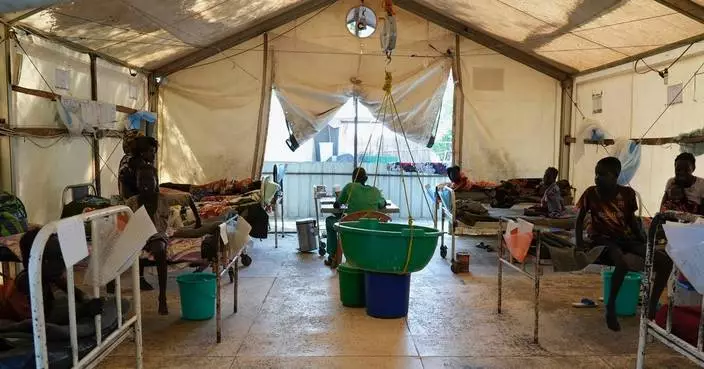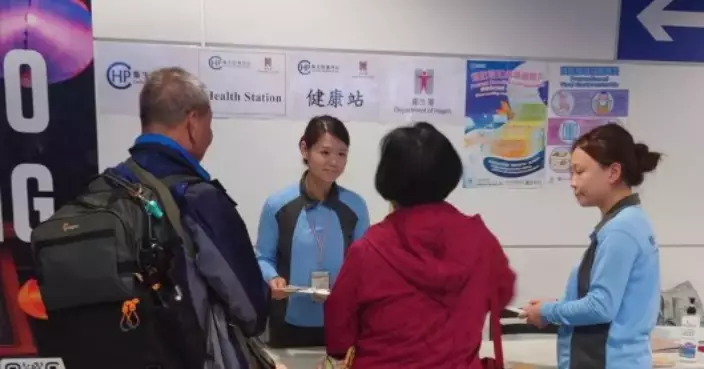Feature · News

Hainan gibbon population rebounds to 42 with robust scientific, legal support

Photos show US-Israeli strikes and Iran's response

CMG reporter helps evacuate Chinese nationals from Dubai airport

Iranian FM condemns US-Israeli strikes on girls' elementary school

Chinese FM calls for immediate stop of military operations in Middle East

China's top political advisory body steps up efforts to forge strong sense of community for nation: spokesman

BP China Insight : China Once Looked Up to Siemens—Now Germany Looks Up to Unitree

Export-Import Bank of China unveils financial support measures for Hainan FTP

Iranian ambassador condemns U.S.-Israel strike on Natanz nuclear site

Palestinian death toll in Gaza rises to 72,097

What to know about the deadly shooting at a Texas bar and the gunman

People pay their respects to the late Rev. Jesse Jackson, in photos

Health Department Urges Parents to Follow Vitamin D Dosage Guidelines for Infants

Police Implement Traffic and Crowd Control for Fanling Golf Tournament March 5-8

HKMA Warns Public About Fraudulent Banking Scams and Phishing Attempts

Iranian Red Crescent chief decries US-Israeli attacks on service institutions

BP China Insight : China Once Looked Up to Siemens—Now Germany Looks Up to Unitree
Export-Import Bank of China unveils financial support measures for Hainan FTP
Iranian ambassador condemns U.S.-Israel strike on Natanz nuclear site
Palestinian death toll in Gaza rises to 72,097
Hainan gibbon population rebounds to 42 with robust scientific, legal support

Photos show US-Israeli strikes and Iran's response
CMG reporter helps evacuate Chinese nationals from Dubai airport
Iranian FM condemns US-Israeli strikes on girls' elementary school
Chinese FM calls for immediate stop of military operations in Middle East

China's top political advisory body steps up efforts to forge strong sense of community for nation: spokesman

What to know about the deadly shooting at a Texas bar and the gunman

People pay their respects to the late Rev. Jesse Jackson, in photos

Health Department Urges Parents to Follow Vitamin D Dosage Guidelines for Infants

Police Implement Traffic and Crowd Control for Fanling Golf Tournament March 5-8

HKMA Warns Public About Fraudulent Banking Scams and Phishing Attempts
Iranian Red Crescent chief decries US-Israeli attacks on service institutions
Feature·Bloggers

The Latest: Strikes escalate across the Middle East as Iran attacks US Embassy in Saudi Arabia
- Iranian strikes on Amazon data centers highlight industry's vulnerability to physical disasters
- Noem blames 'violent protesters' for Minneapolis chaos under tough questioning in a Senate hearing
- Israel steps up airstrikes in Tehran, as Iran widens its response across the region
- The Latest: Primary voters head to the polls in Texas, North Carolina and Arkansas
- 1 of 2 men arrested in the Cincinnati nightclub shooting arraigned on charges
- Texas GOP Sen. Cornyn tries to hold his seat while Democrats Crockett, Talarico face off for Senate
- Justice Department lawyer says concert ticket industry is broken because of Ticketmaster
- Anxious travelers scramble as Iran war strands tens of thousands across the Middle East
- Father who gave gun to Georgia school shooting suspect for Christmas is guilty of 2nd-degree murder

Thousands attend funeral in Iran for students killed in US-Israeli strikes
- Protesters rally in Bulgaria against US-Israeli strikes on Iran
- Demonstrations take place across US after US-Israeli strikes on Iran
- No use or threat of force serves all parties, including Israel: Chinese FM
- 'Ice City' of Harbin shines bright with warm celebrations at Lantern Festival Gala
- Yibin sub-venue paints touching portrait of maternal love, reunion during Lantern Festival Gala
- Death toll from US-Israel strikes on Iran rises to 787: Iranian Red Crescent Society
- China expresses concern over U.S.-Iran conflict spillover, urges de-escalation
- Song celebrating female entrepreneurial spirit in Yiwu features during Lantern Festival Gala
- Hefei sub-venue spotlights rich Chinese culture, hopes

TECNO CAMON 50 Series: Redefining Professional Imaging Through the Power of Practical AI
- War with Iran strains the US-UK relationship as Starmer and Trump disagree
- High-tech snowplows and AI help cities clean up from big storms
- isinwheel Launches Spring Promotion and New Product Presales to Support New Season of Electric Scooter Riding in U.S.
- Asian shares are mostly lower as investors focus on the Iran war's impact on energy supplies
- The Ferrero Group announces new governance and leadership roles, reporting into Giovanni Ferrero, President of Ferrero International S.A.
- How Love Rocks became a NYC tradition and a major God's Love We Deliver fundraiser in 10 years
- GameChange BOS Transformers Achieve Short-Circuit Certification, Validating Resilience for Critical Grid Infrastructure
- Iran war casts a pall over UK economic update as stocks tank and oil and gas prices surge
- iClever Joins Forces with Renowned Audiologist Kellsie Busho to Champion Children's Hearing Health on World Hearing Day 2026

26 Doctors without Borders workers remain unaccounted for in South Sudan a month after attacks
- Experts talk how to navigate distressing news stories and finding coping mechanisms
- Accessible walks bring the joys of birding to people with mobility and other limitations
- Electrolyte supplements are everywhere. Who benefits from them and when?
- OpenAI gets $110 billion in funding from a trio of tech powerhouses, led by Amazon
- Callers to Washington state hotline press 2 for Spanish and get accented AI English instead
- NASA revamps Artemis moon landing program by modeling it after speedy Apollo
- One Tech Tip: Unspoken group chat rules you're probably ignoring, but shouldn't
- New sleeping sickness pill gets nod, paving the way for use in Africa
- Growing more complex by the day: How should journalists govern use of AI in their products?

An Oscar race that looked like a runaway may be a close call, after all
- Robert De Niro to deliver Lincoln’s civility warning at a Carnegie Hall benefit
- Dutch museum makes 'needle in a haystack' confirmation of Rembrandt painting
- Photos of revelers celebrating Holi, the Hindu festival of colors, in India's Mathura
- Justin Timberlake sues to block release of police video from 2024 drunken driving arrest in New York
- A canceled Kennedy Center debut, a Carnegie Hall stage and De Niro reading 'Lincoln'
- Inside the Actor Awards: Roars as 'Sinners' wins big, stars mingling and other off-camera moments
- Fresh starts at Gucci, Fendi and Marni set the tone at Milan Fashion Week: 5 trends and buzzwords
- See top photos of stars on the 2026 Actor Awards red carpet and show
- Q&A: K-pop girl group Twice exploded in the last decade. Then 'KPop Demon Hunters' came calling

Jack Hughes returns to his day job in the NHL after TV tour as the US Olympic hockey hero
- Scherzer calls daughter's letter to Blue Jays 'the cutest thing you can possibly imagine'
- Real Madrid confirms Brazil winger Rodrygo has a torn ACL just 100 days before World Cup
- Jets place franchise tag on running back Breece Hall before the deadline, AP source says
- Bay Hill highlights busiest week of golf this year and LIV returns in Hong Kong
- Figure skaters with disabilities seek a place in the Paralympic spotlight
- A long-shot American dream hits the F1 grid as Cadillac debuts at the Australian GP
- Aston Martin and Adrian Newey are racing to sort out a dud car as F1 season begins
- Kevin Durant says a wide-open NBA playoff race is fun. It's hard to argue with that
- Report: Pakistan cricketers fined after failing to reach Twenty20 World Cup semifinals

Labour Department Urges Safety Measures for Electrical Work Amid Hong Kong Rainstorm Warning
- Hong Kong Customs to Assist Non-Hong Kong Dealers at International Jewellery Show with Regulatory Compliance
- Hong Kong Unveils Nature-based Solutions Design Guidelines for Sustainable Urban Development
- John Lee Begins Beijing Visit to Strengthen Aviation and Economic Cooperation with National Authorities
- Hong Kong Aims to Become Global Post-Secondary Education Hub, Engages Panel of Advisors for Strategic Insights.
- Hong Kong to Auction 226 Personalised Vehicle Registration Marks on March 22
- Independent Committee to Begin Hearings on Wang Fuk Court Fire from March 19 to April 2. Public Registration Opens Soon.
- HYAB Launches New Thematic Youth Internship Programmes in Mainland China for Cultural and Media Opportunities
- Hong Kong Celebrates New Year with Cultural Receptions Across Europe, Showcasing Economic Growth and Future Opportunities
- HKMA and AMCM Sign Revised MOU to Enhance Financial Cooperation and Stability in Greater Bay Area

Zhejiang town celebrates Lantern Festival with dragon dance performances
- Demonstrators gather outside Los Angeles City Hall to protest US strikes on Iran
- Hong Kong stocks close lower
- Chinese shares close lower Tuesday
- Q and A book on learning Xi Jinping Thought on Economy published
- U.S. embassy in Riyadh hit by drones
- Beijing, Tianjin, Hebei co-host regional initiative to promote consumption
- New York protesters rally against US-Israeli attacks on Iran
- Takaichi's attempt to revise Constitution deeply disturbing: Japanese civil body
- Grassroots activities undertaken by CPPCC members help 'serve the people' at local level: official
Category · News

The Latest: Strikes escalate across the Middle East as Iran attacks US Embassy in Saudi Arabia

Iranian strikes on Amazon data centers highlight industry's vulnerability to physical disasters

Noem blames 'violent protesters' for Minneapolis chaos under tough questioning in a Senate hearing

Israel steps up airstrikes in Tehran, as Iran widens its response across the region

The Latest: Primary voters head to the polls in Texas, North Carolina and Arkansas

Jack Hughes returns to his day job in the NHL after TV tour as the US Olympic hockey hero

1 of 2 men arrested in the Cincinnati nightclub shooting arraigned on charges

Texas GOP Sen. Cornyn tries to hold his seat while Democrats Crockett, Talarico face off for Senate

Justice Department lawyer says concert ticket industry is broken because of Ticketmaster

TECNO CAMON 50 Series: Redefining Professional Imaging Through the Power of Practical AI

Anxious travelers scramble as Iran war strands tens of thousands across the Middle East

Scherzer calls daughter's letter to Blue Jays 'the cutest thing you can possibly imagine'

Father who gave gun to Georgia school shooting suspect for Christmas is guilty of 2nd-degree murder

4 former Argentine navy officers face trial for 2017 submarine sinking that killed 44 crew members

From Karachi to Beirut, Khamenei’s death sends shockwaves across the Shiite world

What to know about Holi, the Hindu festival of colors

War with Iran strains the US-UK relationship as Starmer and Trump disagree

High-tech snowplows and AI help cities clean up from big storms

Real Madrid confirms Brazil winger Rodrygo has a torn ACL just 100 days before World Cup

Some travelers stranded in Dubai are paying huge sums for private charter flights out

Jets place franchise tag on running back Breece Hall before the deadline, AP source says

Inside Macron’s new deterrence strategy: 8 European allies, 1 French nuclear button

LiveWire™ Unveils One-of-One S2 Alpinista Custom Builds at Mama Tried, Kicking off a Breakout 2026

isinwheel Launches Spring Promotion and New Product Presales to Support New Season of Electric Scooter Riding in U.S.

Asian shares are mostly lower as investors focus on the Iran war's impact on energy supplies

The Ferrero Group announces new governance and leadership roles, reporting into Giovanni Ferrero, President of Ferrero International S.A.

By Light Names Jeffrey R. Jones EVP to Lead Enterprise Cyber Division

How Love Rocks became a NYC tradition and a major God's Love We Deliver fundraiser in 10 years

An Oscar race that looked like a runaway may be a close call, after all

GameChange BOS Transformers Achieve Short-Circuit Certification, Validating Resilience for Critical Grid Infrastructure
Thousands attend funeral in Iran for students killed in US-Israeli strikes

Hipcamp Launches Interactive California Superbloom Forecast Built From 150,000+ iNaturalist Observations

Robert De Niro to deliver Lincoln’s civility warning at a Carnegie Hall benefit

Iran war casts a pall over UK economic update as stocks tank and oil and gas prices surge

iClever Joins Forces with Renowned Audiologist Kellsie Busho to Champion Children's Hearing Health on World Hearing Day 2026

Securus Monitoring Reinforces Market Leadership in Community Supervision at APPA Winter Training Institute

From Devices to Experiences: TECNO Advances Its AIoT Ecosystem with OneLeap Interconnection Solution and Newly Launched Devices

MWC 2026 | Fibocom Unveils AI ECR Solution, Ushering in a New Era of Smart Retail

Bay Hill highlights busiest week of golf this year and LIV returns in Hong Kong

Industrial organizations overestimate remote access security, new global report finds

Russia bans a prominent LGBTQ+ rights group as extremist in a new blow to the beleaguered community

Cleaning Secrets Revealed: 40% of Americans Embarrassed to Admit Last Time They Cleaned Their Toilet

Identifi Adds Michael Muncie as Sales Engineer

Labour Department Urges Safety Measures for Electrical Work Amid Hong Kong Rainstorm Warning

White Castle Turns 105 and Tips Off Spring with Fresh Deals

Israel sends troops into southern Lebanon as Hezbollah says it is ready for 'open war'

Figure skaters with disabilities seek a place in the Paralympic spotlight

As an AI-Native Phone Pioneer, nubia Reshapes the Paradigm of Human-Device Interaction at MWC Barcelona 2026
Protesters rally in Bulgaria against US-Israeli strikes on Iran

Pilot Launches Pilot eats to Fuel Journeys with Food That Goes the Distance

Small plane makes emergency landing in frigid Hudson River and the 2 people aboard swim to safety

Huawei Releases 115 Industrial Intelligence Showcases with Global Customers; and Launches 22 Industrial Intelligence Solutions with Partners at MWC 2026

Netanyahu takes a gamble on American support for Israel with the war against Iran

Huawei's Yang Chaobin: Creating Mobile Value Creates a Better Intelligent World
Demonstrations take place across US after US-Israeli strikes on Iran

New Indie World Showcase Spotlights Upcoming Games on Nintendo Switch 2 and Nintendo Switch

HiRO Leads Cross‑Border Dialogue at JPM, Offering Insights for Biotechs Seeking Asian Investment

Insilico Medicine and Liquid AI Announce Strategic Partnership Delivering Lightweight Scientific Foundation Models for Drug Discovery

Average price for a gallon of gas rises 11 cents overnight to about $3.11 in US, AAA says
No use or threat of force serves all parties, including Israel: Chinese FM

26 Doctors without Borders workers remain unaccounted for in South Sudan a month after attacks
'Ice City' of Harbin shines bright with warm celebrations at Lantern Festival Gala
Yibin sub-venue paints touching portrait of maternal love, reunion during Lantern Festival Gala
Death toll from US-Israel strikes on Iran rises to 787: Iranian Red Crescent Society

NYSE Content Update: Sunbelt Rentals Marks NYSE Listing with Opening Bell

Aderant Appoints Industry Veteran Aisling Fenelon as Chief Revenue Officer

MINISO Debuts Malaysia's First MINISO LAND, Advancing Its Global IP‑Driven Retail Strategy

ESR Launches iPhone 17e Accessories, Completing the Full iPhone 17 Protection Lineup
China expresses concern over U.S.-Iran conflict spillover, urges de-escalation
Song celebrating female entrepreneurial spirit in Yiwu features during Lantern Festival Gala

Beyond Telcos: Exploring Deterministic Paths to Business Success in the Agentic Era

Photos show people fleeing and buildings wrecked after Israeli strikes in Lebanon

AI × Fibre Lights the Way to an Intelligent Future: YOFC Showcases All-Optical Innovations at MWC 2026

Target has another quarter of declining sales but there are signs of improvement to start 2026
Hefei sub-venue spotlights rich Chinese culture, hopes

Quectel and MediaTek Unveil Next Generation 5G-A and Wi-Fi 8 Intelligent CPE Reference Design at MWC 2026

RevitaLash® Cosmetics Launches 5-in-1 Leave-In Hair Mask & Conditioner

National Life Group Ranked Second by The Wall Street Journal in Best Whole Life Insurance Companies of 2026

U.S. Small Business Wage Growth Remains Steady in February

Democrats’ newfound unity faces a test after US and Israeli strikes on Iran
Zhejiang town celebrates Lantern Festival with dragon dance performances
Demonstrators gather outside Los Angeles City Hall to protest US strikes on Iran

Golden Gate Global Announces Milestone 100+ I-526E Approvals for Anasu Phase 1A; Launches Phase 2 of California Wine Country EB-5 Project

Pakistan says its forces killed 67 Afghan troops in cross-border clashes. Kabul rejects the claim









































